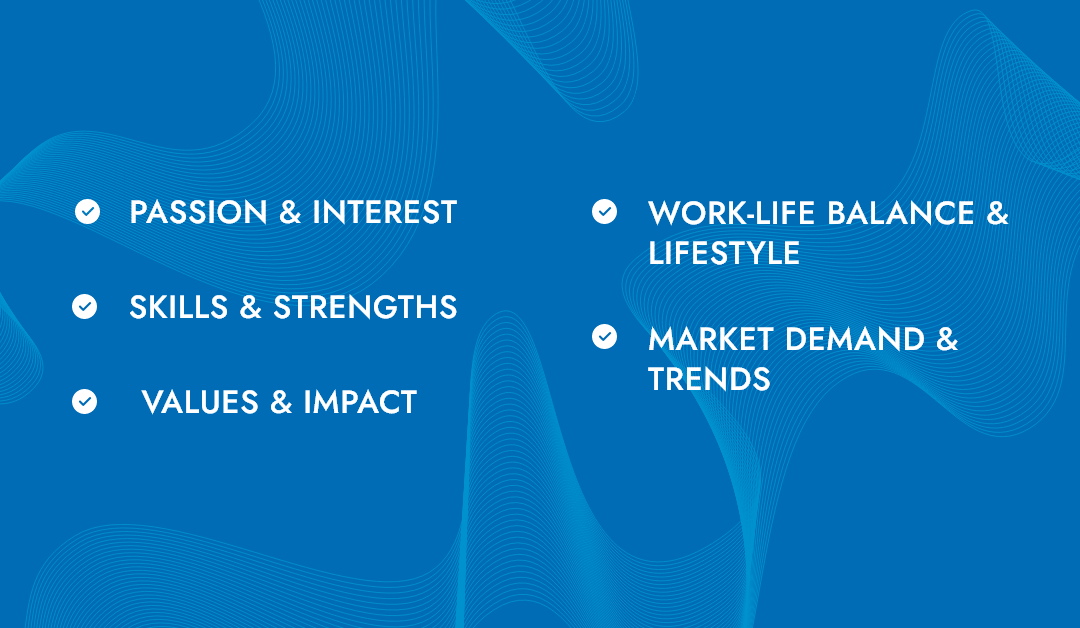“Many people don’t make the conscious decision to navigate their career options and the opportunities to run parallel careers. Don’t be the many people. Take charge of your power to consciously choose a career path, or paths, that fits with the life you are creating for yourself.”
― Katherine Ann Byam
Beginning a career journey is similar to setting sail on a vast ocean of possibilities, where every wave represents a potential opportunity. It’s a journey filled with excitement and anticipation. The transition from academia to the professional field can be tough for recent graduates, as they navigate through uncomfortable zones and shape their workplace in the workforce. Similarly, experienced professionals contemplating how to choose a career may find themselves at a crossroads, torn between the comfort of familiarity and the area of new horizons. In this dynamic landscape, understanding the key factors that influence career decisions becomes most important, guiding individuals toward paths that align with their passions, values, and aspirations.
In uncertainty, there’s also a sense of empowerment—a realization that the course of one’s career is not fixed but shaped by deliberate choices and actions. Each decision becomes a stepping stone, propelling individuals closer to their goals and aspirations. It’s a journey of self-discovery where individuals unearth hidden talents, overcome challenges, and embrace growth opportunities. Along the way, they build meaningful connections, gain valuable insights, and cultivate resilience in the face of adversity. As they navigate how to choose career paths, they emerge not only with professional achievements but also with a deeper understanding of themselves and their place in the world.
Here are five crucial factors to consider as you navigate the maze of career choices
- Passion and Interest: They say, “Choose a job you love, and you’ll never have to work a day in your life.” While it may sound idealistic, there’s truth in the notion that pursuing your passions leads to greater job satisfaction and fulfillment. Take time to explore your interests, hobbies, and values. How to pick a career? What career should I choose? How to choose a career By identifying your passions, you can narrow down career options that align with your interests, ensuring that your work is not just a means to an end but a source of joy and purpose.
- Skills and Strengths: Self-awareness is key to making informed career decisions. Assess your strengths, weaknesses, and areas of expertise. Reflect on your academic background, work experience, and any specialized skills or certifications you possess. Consider feedback from mentors, colleagues, or past performance evaluations. Recognizing your strengths allows you to leverage them in how to choose a career, maximizing your potential for success and job satisfaction. Additionally, identify areas for growth and development, as continuous learning is essential for career progression and adaptability in a dynamic job market.
- Market Demand and Trends: In today’s rapidly changing economy, staying updated on market trends and industry demand is crucial for choosing a career. Research job market projections, industry reports, and labor market statistics to identify sectors with high demand and growth potential. Consider emerging technologies, evolving job roles, and shifting consumer preferences within your areas of interest. By aligning your career choice with market demand, you increase your employability and future-proof your career against industry disruptions.
- Work-Life Balance and Lifestyle: Achieving a balance between work and personal life is paramount for overall well-being and job satisfaction. Evaluate your lifestyle preferences, values, and priorities on how to choose a career path. Consider factors such as work hours, flexibility, commute time, and the potential for remote work arrangements. Assess the culture and values of prospective employers to ensure they align with your own. Striking the right balance between professional commitments and personal pursuits fosters greater happiness, resilience, and longevity in your career.
- Values and Impact: Many individuals seek meaning and purpose in their work beyond financial rewards and career advancement. Reflect on your values, beliefs, and the impact you aspire to make in your chosen field. Consider whether the organization’s mission and values align with your ethical principles and social responsibility. Explore opportunities to contribute positively to society, whether through environmental sustainability initiatives, community engagement programs, or advocacy efforts. Giving priority how to pick a career that resonates with your values allows you to find fulfillment and satisfaction in making a difference in the world.
Navigating how to pick a career requires careful consideration of multiple factors, including passion, skills, market demand, work-life balance, and values. By evaluating these key factors thoughtfully, you can make an informed decision that aligns with your aspirations and aspirations. Remember that what career should i choose is a continuous process, and it’s okay to reassess and pivot as your interests and circumstances evolve. Embrace the journey with an open mind, curiosity, and a willingness to embrace new opportunities. Your chosen career path is yours to shape, and by prioritizing authenticity, purpose, and growth, you can embark on a fulfilling and rewarding professional journey.
In conclusion, as you embark on your journey to choose a career path, remember that it’s not just about finding a job; it’s about discovering a vocation that matches your passions, values, and aspirations. By considering factors such as passion, skills, market demand, work-life balance, and values, you can make an informed decision that aligns with your personal and professional goals. Additionally, ongoing learning and development play a crucial role in shaping your career journey. That’s why programs like the Global Career Counselling Program (GCC) by Univariety in collaboration with UCLA Extension are invaluable resources for individuals pursuing a career in counselling. The GCC program offers comprehensive training and certification in counselling, equipping aspiring counsellors with the knowledge, skills, and techniques needed to make a meaningful impact in the lives of others. With a diverse range of counselling techniques and resources available, counsellors can continuously expand their collection and enhance their effectiveness in supporting individuals through various challenges and transitions.
Sukriti is a Hyderabad-based Writer, covering the exciting world of Career Counselling and Entrepreneurship. She also writes about mega-trends in education, diversification for Teachers & other individuals with a focus on how innovation and upskilling can help them grow professionally. She is an MBA in Public Relations & Event Management. When she is not trying to understand complex changes & needs in the counselling and education industry, she enjoys travelling and watching movies with a cup of black ginger tea.













